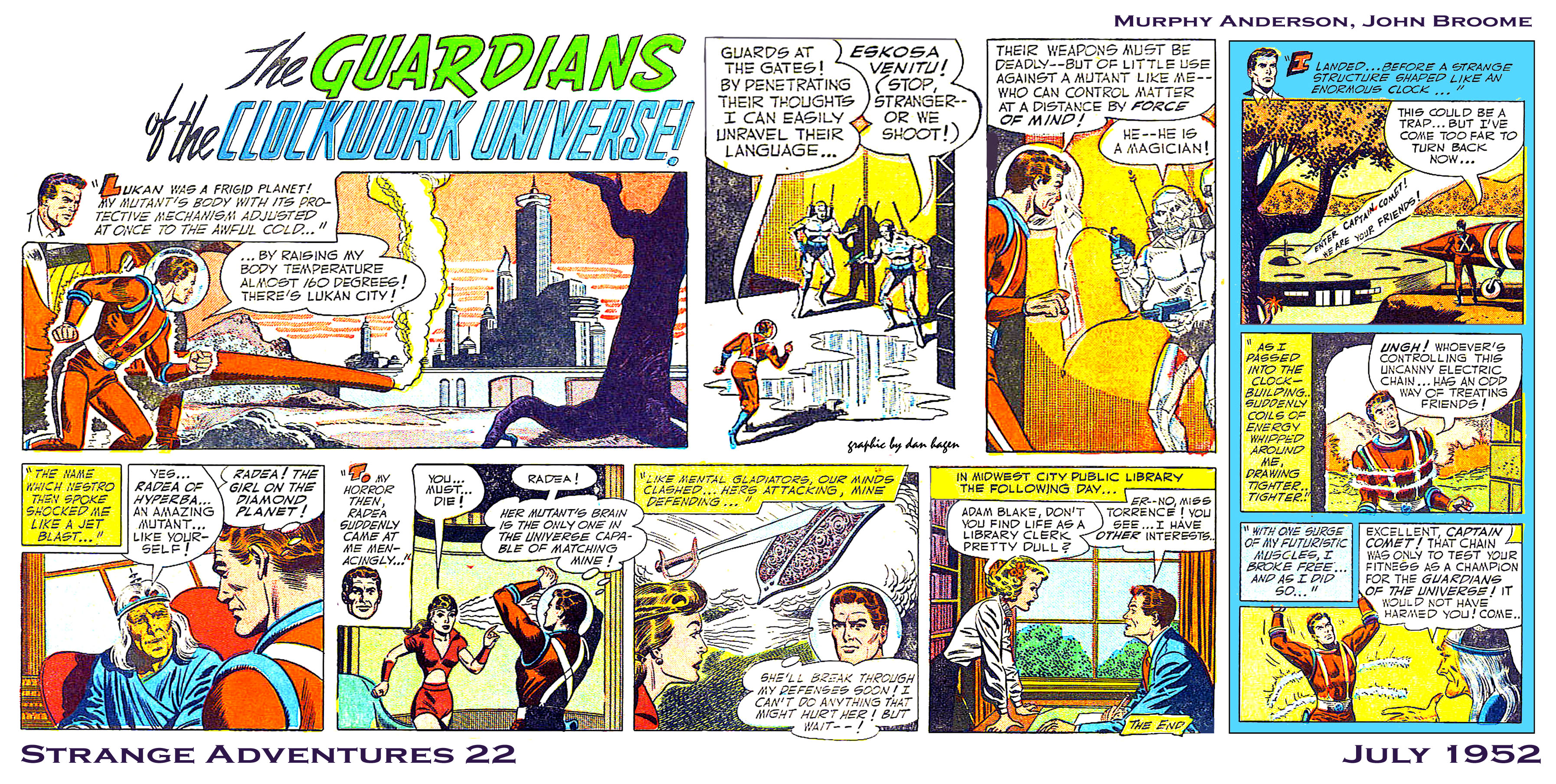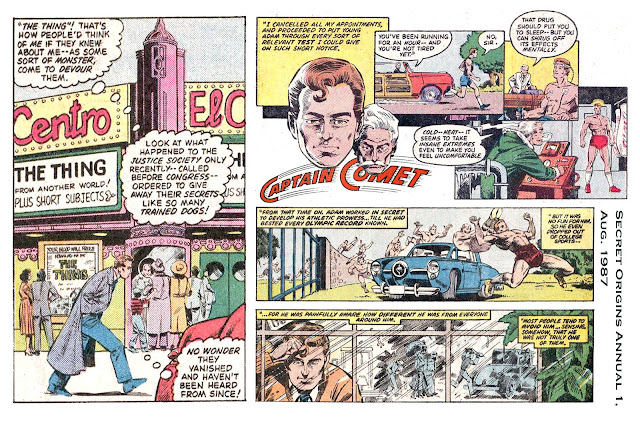July 1952: The Galaxy’s First Guardians
This Captain Comet adventure
influenced the Silver Age revival of one of DC’s most popular superheroes.
In Guardians of the Clockwork Universe (Strange Adventures 22, July 1952), the Man of Destiny is
telepathically summoned by the wizened, golden-skinned Guardians of the
Universe, an ancient, advanced race working to keep planets and suns in their
proper orbits.
The story is framed as a
flashback. When a young patron asks Midwest City public librarian Adam Blake what
keeps the planets where they are, Blake replies, “Er, gravitational force,” but
thinks: “That’s only part of the answer, but he’d never believe the actual truth.”
He recalls that he’d been
tinkering with his “private jetship” the Cometeer in its shed behind Prof.
Zackro’s lab when he received a telepathic message.
“The thought-beam, steady as a
radio signal, led me far out into space … where, beyond the reaches of our
solar system, I saw that tiny world … shining by some unearthly, sunless light.”
Called to an enormous clock-shaped
building, Comet is swiftly tested and found worthy of becoming a champion for
the golden-skinned, white-haired beings.
 |
| Explanations were required in a 1971 reprint. |
Comet is shocked to learn that his
fellow mutant superhero Radea, the “Girl on the Diamond Planet” (Strange Adventures 12, Sept. 1951), had
already been sent to stop the leaders of the planet Lukan, who plan to move
their world closer to its sun so they can attack other planets. But she has
gone missing and is feared dead.
Compensating for Lukan’s frigid
atmosphere by raising his body temperature to 160 degrees, Comet fights his way
to Radea’s side, but she doesn’t recognize him. The malevolent crystalloid aliens
who have “radio-hypnotized” her turn her against Comet, and a telepathic duel
ensues (symbolized by Radea’s mental sword crashing against Comet’s mind
shield).
He frees Radea’s mind by snatching
a control circlet from her head, then uses vibrations from his ray blaster to
shatter the crystal beings like glass. He and Radea leave a peace party in
charge of the planet.
“On the way home, the image of
Nestro sprang upon the visiplate in my cockpit,” Comet recalls.
As Nestro thanks him, the Man of
Destiny thinks, “The Guardians of the Universe! They fight for the same things
I do — for peace and justice — against evil! I will always answer their
summons!”
Blue-skinned Guardians of the
Universe would of course become central to John Broome and Gil Kane’s
streamlined, jet-age revival of Green Lantern in 1959, under the same editor,
Julius Schwartz.
“Broome will make the Guardians of
the Universe central characters in his Silver Age Green Lantern stories,” noted
comics historian Michael E. Grost. “It is startling to see an early version of
them in his Captain Comet tales. … Similarities: both Guardians are nearly all
wise beings who care for the well being of the entire universe. Both have
chosen an Earth hero (Captain Comet, Green Lantern) to be their champion. Both
summon him through sending voices to Earth. Both send him on missions to other
planets, of vital importance.”
Early on, those Guardians
telepathically summon Hal Jordan, the Green Lantern of Space Sector 2814, to
assist another Green Lantern, Tomar-Re of the planet Xudar, in a neighboring
sector.
Credit for inspiring both these
Captain Comet and Green Lantern stories should go to Edward Elmer “Doc” Smith’s
Lensman series of six science
fiction novels (1934-1948), which featured telepathically powered space
patrolmen guided by “guardians” in the form of the peace-loving, staggeringly
ancient Arisians.






Bruce Kanin:
ReplyDeleteI’ll say again that I would buy a trade paperback or DC Archive Edition (if they still made them) collecting all of Captain Comet’s Atomic & Silver Age tales.
Heck, what a streaming (live action) series it would make!
Stuart McCabe:
ReplyDeleteFantastic piece of comic book history. I had never heard of Captain Comet or his influence on other more famous characters.
Joe Nowak:
ReplyDeleteA most excellent post -- especially going back to the "Lensman" series of science fiction. Thank you for posting.
Carl Thiel:
ReplyDeleteThanks for this. Did not know it.